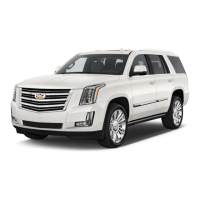Do you have a question about the Cadillac ATS 2018 and is the answer not in the manual?
Guide on how to quickly locate information using the manual's index.
Explanation of hazard messages found on labels and in the manual to avoid or reduce them.
Overview of the instrument panel and its components.
Brief overview of features related to starting and driving the vehicle.
Details various features of the vehicle, including infotainment and driver assistance.
Information on traction control, tire pressure monitoring, and fuel.
Information on vehicle keys and locking mechanisms.
Details related to vehicle doors, including trunk operation.
Information on theft-deterrent features and alarm systems.
Description of exterior mirror adjustments and features.
Information on rearview mirrors and their adjustment.
Operation of power windows and window lockout features.
Information regarding the vehicle's sunroof operation.
Information on adjusting and using front and rear head restraints for safety.
Details on seat adjustment, lumbar support, memory features, and heated seats.
Information on rear seat operation, including folding seatbacks and pass-through doors.
Instructions on proper seat belt usage, including special considerations for pregnancy and children.
Comprehensive information about the vehicle's airbag system, including operation and safety.
Guidance on selecting and properly installing child restraints for safety.
Details on various storage areas within the vehicle, including the instrument panel and glove box.
Information on features like cargo tie-downs for securing items.
Operation of various vehicle controls, including steering wheel adjustments and climate controls.
Explanation of all warning lights, gauges, and indicators on the instrument cluster.
Information on the Driver Information Center (DIC) and Head-Up Display (HUD).
Interpretation of various messages displayed by the vehicle's systems.
Options for customizing vehicle settings and features.
Operation and programming of the universal remote system.
Operation of exterior lamps, including automatic headlamps and turn signals.
Details on interior lighting controls, dome lamps, and reading lamps.
Information on entry lighting, exit lighting, and battery power protection.
Overview of the infotainment system, covering radio, audio, phone, and navigation.
Information on the PDR system, its important usage details, and data recording.
Operation of dual automatic climate control systems (Base and Uplevel).
Adjustment and operation of air vents for airflow control.
Information on replacing the passenger compartment air filter and servicing the climate control system.
Guidance on safe driving practices, including distracted driving, defensive driving, and drunk driving.
Procedures for new vehicle break-in, ignition positions, and starting the engine.
Information on All-Wheel Drive systems and their operation.
Details on antilock brake systems, parking brakes, and brake assist features.
Explanation of traction control, stability control, driver mode control, and competitive driving modes.
Operation and settings for cruise control and adaptive cruise control.
Overview of systems designed to help avoid crashes, including forward collision alert and lane keep assist.
General advice on vehicle service, parts, and dealer information.
Information on chemicals in vehicles known to cause cancer or reproductive harm in California.
Guidance on performing routine owner service work and safety precautions.
Instructions for opening and closing the vehicle's hood.
Identification of key components within the engine compartment for various engine types.
Explanation of the engine's cooling system and how to check and add coolant.
Information on recognizing and responding to engine overheating situations.
Guidance on selecting and using windshield washer fluid.
Information on brake pad wear indicators, brake squeal, and high-performance brake linings.
Details on checking and adding brake fluid, including warnings about contamination and overfilling.
Information on the original equipment battery, its location, and handling precautions.
Recommendations for storing the vehicle for extended periods.
Explanation of the All-Wheel Drive system and its lubrication requirements.
Guidance on checking transfer case fluid and its importance.
Procedures for checking the starter switch and ensuring proper operation.
Steps to verify the function of the automatic transmission shift lock control.
Procedures for checking the parking brake and park mechanism.
Instructions on how to remove and replace windshield wiper blades.
Considerations for windshield replacement, especially for HUD systems.
Information on gas struts used for hood, trunk, and liftgate assistance.
General advice on vehicle service, parts, and dealer information.
Details of the maintenance program covering select services for the first three years.
Schedule of owner checks and services, including engine oil changes and tire rotations.
Services for specific vehicle uses, like commercial use or underbody flushing.
Information on services and conditions that may indicate required attention for the vehicle.
Lists recommended fluids, lubricants, and replacement parts for vehicle systems.
Guidance on recording service dates, odometer readings, and performed services.
Information on the Vehicle Identification Number (VIN), its location, and engine code.
Details on labels that provide information about production options and special equipment.
Approximate capacities for various vehicle systems, including engine oil and cooling system.
Steps to follow if concerns about vehicle sales or operation are not resolved by the dealership.
Procedures for reporting safety defects to government agencies and General Motors.
Information on how vehicle computers record data and privacy considerations.
Overview of OnStar services, including emergency, security, navigation, connections, and diagnostics.
Information on the infotainment system, including navigation and stored data.
General introduction to the OnStar system, its status light indicators, and contact information.
Details on various OnStar services like Emergency, Security, Navigation, Connections, and Diagnostics.
Information on OnStar Smart Driver, in-vehicle audio messages, and transfer of service.
| Brand | Cadillac |
|---|---|
| Model | ATS 2018 |
| Category | Automobile |
| Language | English |












